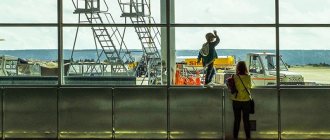When to start
Today it is allowed to transport children who are 7 days old. True, in this case, the carrier may require a receipt from the parents that they understand what risks such a flight may lead to. This allows the airline to absolve itself of liability if something goes wrong.
But in most cases, no special formalities are required - the baby does not even need a separate ticket. The only thing that is advisable to do is to undergo an examination by a pediatrician, who will determine whether there are any contraindications to the flight.
Experts note that, from a convenience point of view, it is better to fly with children aged from birth to six months. This is due to the fact that during this period the child does not yet react to noise, mostly sleeps, and the main thing for him is that his mother is nearby with food. If these conditions are met, the baby in most cases tolerates the flight quite well. For the convenience of parents, a special cradle is provided in which the child can sleep peacefully while the plane is in the sky.
Flying with a baby on an airplane when he is already six months old, but not yet one year old, may not be so pleasant. He is already old enough to just sleep - he is more interested in turning his head around, rushing somewhere. Such little ones become more demanding, which means they can make noise on board. At the same time, his attention is not yet particularly concentrated, so it is problematic to captivate him with something for a long time.
Children from one to two years old can already be interested in cartoons and games on gadgets, which becomes a real salvation during the flight. They also react quite calmly to fairy tales, so they can be read to and thus captivated for a while.
Of course, you need to be very careful when choosing the flight distance - young children do not tolerate long routes particularly well.
Basic Rules
When booking a flight, parents indicate that they require an additional escort service for their child. The age of the baby is also indicated. Then, at the airport, after presenting the ticket and registering, the parents give the child to the airline representative. From now on he is in good hands. A ground service employee will go through all the checks with your child and take him onto the plane, handing over the documents to the flight attendant. During the flight, the child will be constantly looked after by a flight attendant.
When the plane lands, at the end of the route the flight attendant will hand the baby over to the airline's ground employee, who will go through all the checks with him. Then he will hand the child over to the greeter (the person indicated on the accompanying sheet).
Note:
You must indicate the name and surname of the host party in advance in the documents. You can specify two people if you don’t know who exactly will meet him.
Flying with older children
For air carriers, children become full passengers when they reach 2 years of age. From this age, children should purchase a separate ticket, and they can already count on their place on board the ship. Child rates apply up to 12 years of age.
Children at this age cope with flights differently - it all depends on their character and ability to independently engage and interest themselves. But long trips can still tire them out. Therefore, if possible, it is worth planning the flight at night so that the child sleeps most of it.
On a plane with a baby
There is no minimum age threshold at which a newborn can fly by plane. It all depends only on the wishes of his parents and the need for a flight. If there is no urgent need for it, pediatricians do not advise starting air travel with the baby until she reaches at least three months of age.
A newborn baby or baby requires constant attention, especially if it is not in a cozy cradle at home, but in the cabin of an airliner. Many airlines (but not all) pay special attention to passengers with babies and provide special bassinets for convenience that are attached in front of mom or dad’s seat. In this case, the parent will not have to hold the child in his arms the entire flight.
There are some other subtleties that are worth knowing if you are flying with a newborn: it is not always possible to heat baby food on the plane (most often the flight attendant will only offer hot water), so this point should be taken into account by the mother if the baby is bottle-fed. You need to pack the following things in your luggage in advance and always have them with you:
- diapers;
- drinking water;
- formula for feeding (if you are not breastfeeding your newborn);
- wet wipes;
- medications (if needed).
Most airlines (especially large ones) allow children under two years of age to fly absolutely free, although they do not provide a separate passenger seat for a newborn. If parents wish, they can purchase a separate ticket for their child with a personal seat, even if he is under two years old, because children are different and it is not always comfortable for a mother to hold a large bottle in her arms for several hours in a row.
What are the dangers of flying for a child?
It is important to understand why the issue of children flying in the first place arises and is relevant. The main dangerous moment on the entire route for the baby is takeoff and landing. What can we say if even adults feel serious discomfort.
The problem lies in the activity of the Eustachian tube, which is part of the hearing system. It is responsible for the balance of pressure in the middle ear and the environment. If malfunctions begin in such a system, painful sensations and hearing loss may occur—temporary hearing loss may even develop, which greatly frightens children. The younger the child, the less he understands what is happening to him. Which means he gets more scared. And stress makes the situation even worse.
In newborn babies, inflammation of the auditory tube may even occur - after all, it is shorter and reacts more strongly to pressure changes. And this is a direct path to otitis media. Parents whose child has even a slight runny nose should be very careful.
Another negative factor on board an airplane is the dry air - if the flight is long, the baby’s mucous membranes may become very dry. And in this state, it is extremely open to infections and viruses. In a closed airliner there are plenty of the latter. Artificial nasal irrigation with seawater solutions will help reduce the harm somewhat.
How to choose an airline
Before booking a ticket, carefully review the information about whether the carrier provides escort services. Many low-cost airlines (Ryanair and WizzAir) will not monitor the child either during the flight or on the ground. So you will have to choose something else. Also, some airlines do not provide escort for teenagers during transfers or prohibit children from flying at night without adult supervision. Therefore, carefully study the rules and find out at what age you can fly on an unaccompanied plane with your chosen carrier.
Who exactly shouldn't fly?
Experts identify several categories of children who are not advised to fly:
- Premature babies: all their systems are imperfect, they are immature and can react in an unexpected way to actions that seem familiar to many. Doctors advise allowing premature babies to fly no earlier than they are one year old.
- Children who suffer from frequent otitis media, especially purulent ones, should also avoid flights for those who suffer from sinusitis: you should definitely consult a doctor, even if the child has already recovered at the time of the flight, but 3 weeks have not yet passed since the illness
- Children born less than 2 weeks ago
What documents are needed?
If a child flies abroad without parents, then he needs:
- ticket;
- a notarized document in which both parents give their consent to the child’s departure;
- document for the accompanying person (an airline employee is included in it);
- visa (if needed);
- an additional statement from the parents, which indicates the name, surname and other data about the child, full name of the receiving party. The application also indicates the telephone numbers and contact information of both parties.
Note:
For domestic flights, the same package of documents is required, with the exception of a visa. If the teenager is already 16 years old, then permission from parents is not required.
Tickets and discounts
The child will need a ticket in any case. Today there are two categories of children's travel documents:
- Infant (INF) – this category is designed for babies from birth to 2 years
- Child (CHD) – children aged 2-12 years
Depending on the air carrier, the infant category may vary. In most cases, such babies are transported free of charge, but only if the baby does not occupy a separate seat. The air carrier must be notified about the transportation of the baby; parents will still be given a ticket - it is proof of admission to travel on the plane.
It is also important to remember that only one passenger can fly with one child at a 100% discount. If one passenger has two children under 2 years of age, the second one will still have to buy a child category ticket.
There are separate baggage restrictions - children under 2 years old are allowed to carry no more than 10 kg + stroller.
The “children's” ticket category implies a discount on travel of about 50%. In this case, the baby is provided with a separate seat, but there are also advantages - he will have luggage restrictions, like an adult.
If a situation arises that a child turns 2 years old exactly during the travel period, it needs to be resolved with the airline - this is where decisions will be made on the sale of appropriate tickets. In some situations, a one-way ticket is purchased for an infant, and a return ticket for children. Sometimes carriers are accommodating and allow children to be transported both there and back at the infanta fare. There are also those who demand to purchase a round-trip child fare right away.
How to send an unaccompanied child on a plane
If there is a need for a minor to travel independently, you must first familiarize yourself with the rules of the airline you have chosen for the flight.
There are two transportation options:
- Unaccompanied (child flies alone).
- With support (the service is provided for a fee, a responsible person is appointed).
Usually, children from 5 to 12 years old are transported only with an escort due to their age.
Children from 12 years old can fly independently, but some airlines increase the age to 15 years.
The fact that a child can fly alone on an airplane does not mean that he or she cannot be accompanied. At the request of the parents, the escort service can be purchased for both a 12-year-old and a 14-year-old teenager. Some airlines provide this service for up to 17 years.
What possible restrictions do parents need to know:
- The minimum age of a child that most airlines are willing to carry is 5 years. Only a few foreign air carriers take responsibility for transporting children under 5 years of age.
- Some companies do not have an escort service, and many low-cost airlines completely refuse to transport minor children without legal representatives.
- Children from 5 to 8 years old can fly without parents only on direct flights without transfers. From 8 to 11 years old, a flight with a transfer is allowed, but under the supervision of an accompanying airline representative. From the age of 12, children can transfer to another flight independently.
- Not all airlines take children on a flight with a long layover, as this is an additional responsibility.
Procedure
Sending a small child or teenager by air to another city or abroad is an exciting procedure for every parent. To feel calmer and give confidence to your child, you need to study all the nuances of the process in advance.
The algorithm of actions should be approximately as follows:
- It is necessary to call the airline representative in advance and find out if they have available seats for a child who requires an accompaniment or who will be flying alone. The number of such places is limited. No more than 4 children can fly on one plane without parents.
- Arrive at the airport, fill out an application and buy a ticket for your child. This can be done at any time, but the sooner before departure, the better. The ticket price is paid in full without child discounts. In such cases, purchasing air tickets for children online or through intermediaries is unacceptable. Registration only at ticket offices or sales offices of a specific airline.
- Write an application for an escort service, if there is a need for it. The service can only be ordered by legal representatives, parents upon presentation of an identity document. Pay for the service.
- On the day of departure, come with your child to check-in at the airport and bring all the necessary documents. Online pre-registration is not permitted.
Required documents
To send a young traveler alone, you will need to submit the necessary documents when checking in for the flight. Remember that your application must be written when purchasing an air ticket.
What documents are needed:
- Birth certificate or passport, if already 14 years old, for flights within Russia.
- A foreign passport, regardless of age (it is issued from birth) - for flights abroad.
- Visa if necessary.
- Parents' permission to travel abroad, notarized (it indicates the period of stay and the country of residence).
- Power of attorney from legal representatives if a third party delivers the child to the airport.
- Application from parents indicating all necessary information.
- Receipt for payment for escort services.
- Air ticket.
Persons sending and receiving a child must have identification documents with them. The data must match the data in the application. Sometimes it is necessary to fill out separate forms for those meeting and seeing off, indicating detailed information.
After checking in for the flight, all documents are collected and packaged in a special bright envelope with the inscription “UM”, meaning “unaccompanied minor”. This envelope is hung around the neck of a small passenger.
During long flights, complicated by transfers and transits, as well as when flying abroad, you should clarify the need for additional documents with the consulate of the country of arrival, since different countries have different laws and border regulations.
How to write an application for a flight without parents
The application must be filled out when purchasing an air ticket at the airport ticket office. The form can be downloaded on the Internet or obtained from employees at the airport. The application must indicate:
- Child details (full name, age, gender, language of communication, residential address, telephone number).
- Flight information (flight number, flight date, origin and destination).
- Details of the person accompanying the shipment (full name, address, phone number).
- Details of the meeting person (full name, address, phone number).
- Parents' contact information.
- Details of the personnel responsible for the child (full name, signatures).
A sample application can be viewed here.
Three copies are made of the written application. The original is attached to the air ticket, one copy at a time is sent to the airport of departure, the airport of arrival, and the next carrier (if there is a transfer).
To make your flight comfortable - useful information
To make your flight comfortable, listen to the advice of experienced air travelers:
- book tickets in advance;
- choose flights with a small number of passengers;
- plan your flight in the morning;
- arrive at the airport early;
- Prepare older children for the flight in advance (tell them about the plane and the exciting air travel);
- don't forget about new toys;
- before the flight, check the contents of the child’s backpack (personal hygiene items, baby food, water bottle);
- remain calm as the child is very sensitive to the parents' mood.
If you still have questions, make an appointment with your pediatrician. The doctor will tell you whether it is possible to fly with a two-year-old/one-year-old/two-month-old child and about the nuances of such a trip.











